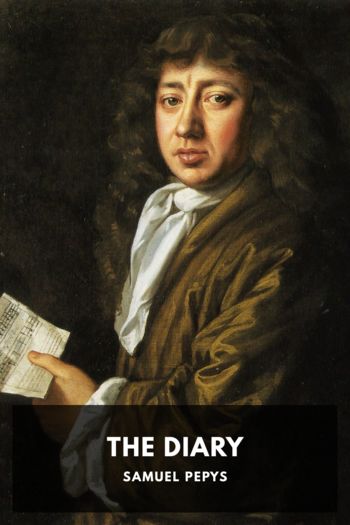The Diary, Samuel Pepys [e reader books TXT] 📗

- Author: Samuel Pepys
Book online «The Diary, Samuel Pepys [e reader books TXT] 📗». Author Samuel Pepys
Charles Porter “was the son of a prebend[ary] in Norwich, and a ’prentice boy in the city in the rebellious times. When the committee house was blown up, he was very active in that rising, and after the soldiers came and dispersed the rout, he, as a rat among joint stools, shifted to and fro among the shambles, and had forty pistols shot at him by the troopers that rode after him to kill him [24th April, 1648]. In that distress he had the presence of mind to catch up a little child that, during the rout, was frighted, and stood crying in the streets, and, unobserved by the troopers, ran away with it. The people opened a way for him, saying, ‘Make room for the poor child.’ Thus he got off, and while search was made for him in the marketplace, got into the Yarmouth ferry, and at Yarmouth took ship and went to Holland. … In Holland he trailed a pike, and was in several actions as a common soldier. At length he kept a cavalier eating-house; but, his customers being needy, he soon broke, and came for England, and being a genteel youth, was taken in among the chancery clerks, and got to be under a master. … His industry was great; and he had an acquired dexterity and skill in the forms of the court; and although he was a bon companion, and followed much the bottle, yet he made such dispatches as satisfied his clients, especially the clerks, who knew where to find him. His person was florid, and speech prompt and articulate. But his vices, in the way of women and the bottle, were so ungoverned, as brought him to a morsel. … When the Lord Keeper North had the Seal, who from an early acquaintance had a kindness for him which was well known, and also that he was well heard, as they call it, business flowed in to him very fast, and yet he could scarce keep himself at liberty to follow his business. … At the Revolution, when his interest fell from, and his debts began to fall upon him, he was at his wits’ end. … His character for fidelity, loyalty, and facetious conversation was without exception”—Roger North’s Lives of the Norths (Lord Keeper Guilford), ed. Jessopp, vol. i, pp. 381–2. He was originally made Lord Chancellor of Ireland in the reign of James II, during the viceroyalty of Lord Clarendon, 1686, when he was knighted. “He was,” says Burnet, “a man of ready wit, and being poor was thought a person fit to be made a tool of. When Clarendon was recalled, Porter was also displaced, and Fitton was made chancellor, a man who knew no other law than the king’s pleasure” (Own Time). Sir Charles Porter was again made Lord Chancellor of Ireland in 1690, and in this same year he acted as one of the Lords Justices. This note of Lord Braybrooke’s is retained and added to, but the reference may after all be to another Charles Porter. ↩
Rupert. ↩
Kingsgate Street, High Holborn, called after the gate placed at the end of the street. In the reign of James I it was a mere country lane, with a barred gate at its entrance, which, from that monarch’s usually passing through it, on his way to Theobalds, received the denomination of King’s Gate. Theobald’s Road (formerly King’s Road), to which the street leads, takes its name from the same cause. ↩
Paulina Montagu. See March 1st, ante. ↩
Her maiden sister. See note 3123. ↩
The Sugar Loaf and Green Lettice was a tavern in Fleet Street, the site of which is now incorporated with Child’s Bank. Mr. F. G. Hilton Price writes:
“Of the Sugar Loaf and Green Lettice we cannot glean any history; it was situated immediately in the rear of the Marygold, and the kitchen of the present bank is a part of those premises, and puts one greatly in mind of what the dining-room at Dick’s Coffeehouse used to be when kept by Mr. Quelch, and closely resembles the interior of the old Rainbow tavern. But both these latter coffeehouses were established after the Marygold ceased to exist as a tavern.”
Temple Bar, or Some Account of “ye Marygold”, 1875, p. 8↩
The difficulty of deciding as to the parentage of Betty Turner is very great. In some places it appears as if she were the daughter of Mrs. Turner, the wife of Mr. Turner of the Navy Office, but here and on the 13th instant there is a distinct reference to Pepys’s cousin, Mrs. Jane Turner, “and her two daughters,” although it is generally stated that Theophila was the only daughter of Serjeant John and Mrs. Jane Turner. Betty must, therefore, have been a younger sister of Theophila; but if so the received information respecting Serjeant Turner’s children is very incorrect, for, according to Pepys, Betty had two brothers not elsewhere mentioned. ↩
Henry, the ninth earl, called the Wizard Earl, was confined in the Tower from 1605 to 1621, and the walk was probably constructed for his use during that long imprisonment. He hired the Brick tower from Lord Carew, Master of the Ordnance, as an occasional residence for his son Algernon. ↩
Coke’s Institutes; third part. ↩
The Rolls House and Chapel. ↩
The Crown Office in the Temple gave its name to Crown Office Row, but the Crown Office now forms a part of the central office of the Supreme Court of Judicature at





Comments (0)